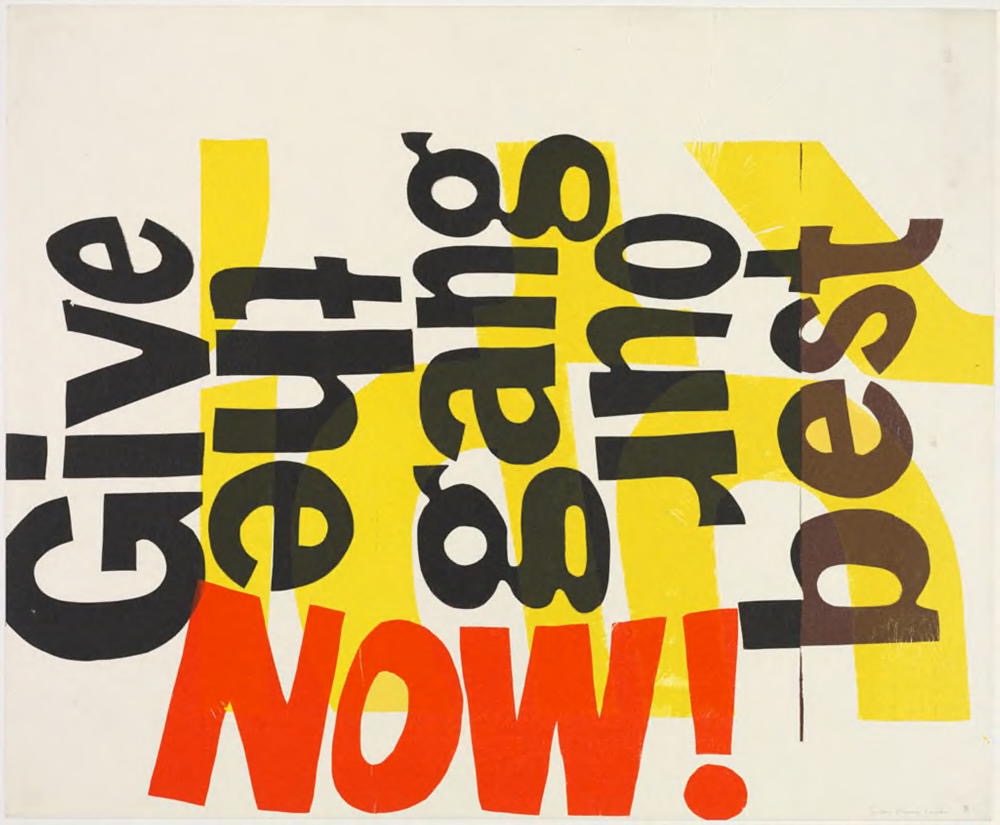Revisiting

Corita Kent (Sister Mary Corita): give the gang our best (1966)
"…genuinely inept actors."
I ask myself which FollowingChapters Story might be "the best" without really expecting anybody to answer my question, let alone myself. The question itself seems irrelevant because I never intended there to be any competition between them. Sure, some seemed better and others worse at inception, but often, the stories that seem the worst to me when creating them attract the most positive attention once I post them. My nose seems reliably unreliable. But then, I do have my favorites, the ones that seem the most resonant and those that surprised me, even a few that delighted me. It's noisy at my writing desk when I'm writing and even noisier when I'm reading through what I've just finished, then noisier still when I'm compiling a series of pieces into a comprehensible whole. And even noisier, though this never seems possible, when I sit down to peruse what I've compiled, reading through the collection for the very first time.
How many times might I need to read through the whole collection to pass fair judgment upon the whole, let alone to gain enough traction to definitively choose one story as "the best?" I'm probably better off leaving that work to critics or more interested readers, though they largely remain anonymous or, perhaps, just non-existent. I have not developed a network of dedicated reviewers to choose my best for me, and since I shrink from that work myself, nobody does it. This ain't no tragedy. I never intended to enter any of my stories into a competition. I created them to catalogue my manner of living, which I'm continually perfecting without ever expecting to perfect it. I hunt and peck, shifting my focus as my intuition suggests, posting here primarily for unknowable reasons. In this context, "the best" holds little credence.
As I began to read through these collected stories, though, I found myself judging. Few seem to suspect how little I remember later of what I've written. Some stories seem utterly unfamiliar, though I know for sure that I spent a few hours of my life initially creating them. Few of them seem definitive. I didn't carve them in stone or even reduce them to paper. My stories seem virtual in all of the ways they should seem that way. When I print them out, they get underfoot, as I never know where or how to file them. I leave them in their virtual files, in order of creation within each central theme. This story will be the final one in the now lengthy FollowingChapters Series file. I might later reorganize them into a more formal manuscript form. This will require more copying and pasting than anyone should willingly agree to, the least creative and pickiest pastime ever imagined. Most will never be so rendered.
All that said, I can nominate one story that stole my breath as I was reading through the FollowingChapters compendium. Note that I have only made it through three of the thirteen weeks' entries as of this writing, but the story titled Unamerican struck me as especially noteworthy. It got me because it pointed out something obvious that I'd never noticed before. Those often prove to be the most shocking. This seems a noble purpose, too, for writing stories, to point out the more unacknowledged obvious. The gist, if one exists, is that no action really qualifies as Unamerican. This melting pot might have invited in every possible human action and witnessed each one. It's not the behavior that erodes the union, or not those alone. Prior insurrections seemed to make us stronger. The concern I discovered in this story was more focused on the anti-American elements, which aimed to undermine our diverse, equal, and inclusive intentions, our efforts to strive for perfection, and our aspiration to settle for what could never be considered truly American, instead embracing mediocrity as greatness. We're seeing that attempted now, fortunately, by genuinely inept actors.
©2025 by David A. Schmaltz - all rights reserved


